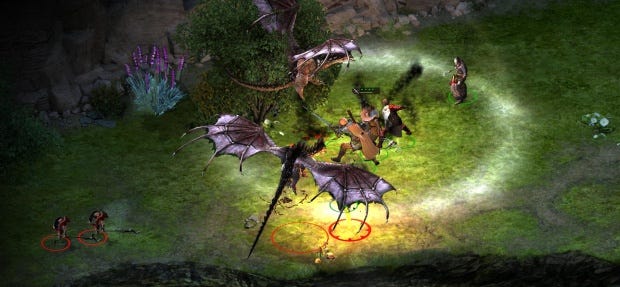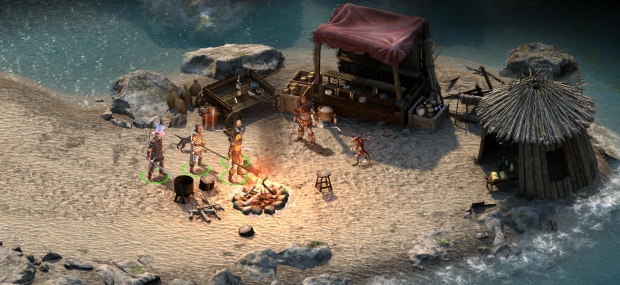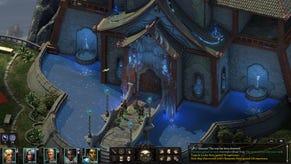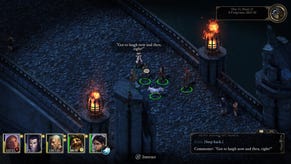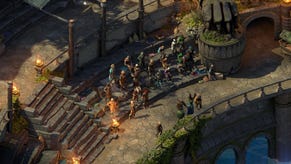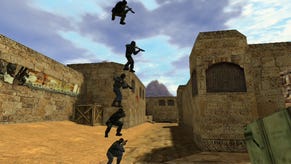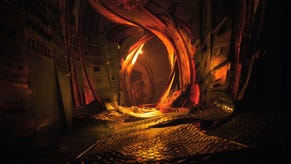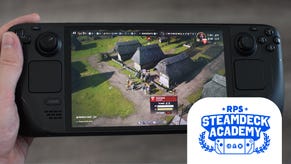Collaborative Storytelling In Pillars Of Eternity
Who do you want to be?
I take roleplaying seriously. That's not to say I have a cupboard full of lucky dice or a handcrafted elven tunic - what I mean to say is that when I play an RPG, I try to make all of my decisions based on my character rather than the systems. I'll pass up a huge pile of loot if I don't think that taking it would be in-character. Roleplaying is a performance of sorts and Pillars of Eternity [official site] encourages my particular approach to the genre by combining a huge, tightly scripted plot with systems that go some way toward mimicking the best qualities of a human Dungeon Master.
Pillars of Eternity is a free-form game. It's heavily scripted of course, as much about story as RPG systems (and story IS, perhaps, the ultimate RPG system), but it offers a model of “open” gaming that runs against the trend of open world adventuring. There's plenty to do in Obsidian's latest and you're likely to end up with a sizable log of ongoing quests, but the emphasis is always on your approach to those tasks and side stories rather than the sheer quantity of them.
It's an open character game rather than an open world game, and where the structure of many modern RPGs might ask “Which of the 5,000 available quests do you want to tackle next?”, Pillars is usually asking a more ambitious follow-up question: “How do you want to tackle it?”
I spoke to Josh Sawyer a couple of months before the game's release and we spent a few minutes discussing the influence of pen and paper RPGs. Now that I've played the game – although I haven't finished it – it's easy to see how those influences have been translated. One of the design objectives that Sawyer mentioned involved enormous charts tracking the instances in the game when each skill, ability or trait could be utilised, or affected an encounter. The goal was to ensure that the game was inclusive, in the sense that every choice would be rewarded rather than leading to regret.
Characters in a party-based RPG can sometimes feel like keys on a ring. Reach a certain point in a certain dungeon and you might realise that you need a rogue to disarm the traps and pick he locks. Later on, you might need a wizard to defuse some arcane mystery. You'll definitely need a cleric to bandage your wounds.
In Pillars, the player character is a skeleton key. The game constantly contorts its scenarios to ensure that your choices are the RIGHT choices – not necessarily the BEST choices, but decisions that will be rewarded in some way. You should never feel that you picked the least exciting option when levelling up because the game is moulding itself around the role you want to play rather than demanding that you bring a specific toolset or bag of tricks to the table.
Implemented successfully, as it is in Pillars, it's the kind of systemic design that doesn't draw attention to itself. We're much more likely to notice a dead-end than a doorway.
The charts that Obsidian drew up, tracking the relevance of each ability, are more than abstract checklists. True enough, the mathematical data proved useful when working on balance. The charts helped the developers to introduce new solutions to some scenarios that used previously underutilised skills, and if two similar abilities both appeared rarely, the charts provided evidence to support a decision to merge those abilities. But Pillars of Eternity's number-crunching is more than simple box-ticking - it's a weird simulation of a human being.
By contorting itself to accommodate the player character's whims, Pillars of Eternity is attempting to mimic the improvisational qualities that are the mark of a good Dungeon Master. Behind all of the checklists and quotas, Obsidian's RPG ethos is focused on the freedom of roleplaying within a narrative. It's a game in which breadth is as important as length and depth, eager as it is to accommodate all play styles.
“Play styles” aren't limited to combat, or difficulty settings. If you want to test every conversation choice and aim for an optimal outcome, Pillars supports that. But if you'd rather take the cultural background and lore around your character to heart, and develop his/her personality as you play, the game is designed to respond to that by allowing you to stay in character as much as possible.
Of course, it isn't really responding at all. Every outcome is scripted rather than dynamically generated, and that's the thing that I've found most impressive. Sawyer told me, before release, that he didn't want the game to be like a bad Dungeon Master. As he described what makes a social pen and paper RPG session work well, I was reminded of improvised comedy – you take what your partners throw at you and you run with it. Never shut the conversation down and always roll with suggestions, incorporating them as best you can.
A tightly scripted singleplayer epic like Pillars of Eternity will never be able to respond to every possible player input but that it can even come close to approximating a social experience is wonderful. I've become accustomed to equating collaborative storytelling, between a designer and a player, as a thing that's best achieved in games that either show without telling or string together procedural phrases. In the former category I'd place everything from Cities: Skylines to Euro Truck Simulator, and the latter includes both Dwarf Fortress and Football Manager.
Pillars of Eternity is the rare example of a game with a strong authorial voice and enormous script that still leaves space for many player roles. It's that, more than any nostalgia buzz, that's likely to keep me playing for another forty or fifty hours, and then replaying to tell the same story with a different voice.
Pillars of Eternity is available now - here is our review.
